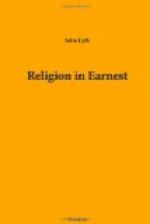Her earliest recollections were associated with the farm at Sandygate. When about four years old, her grandfather Stables, now reconciled to his daughter, proposed to undertake the charge of Mary’s training and education. This arrangement was overruled, providentially as it would seem; for Mr. S., although strictly moral and religious in his way, was a stranger to experimental godliness, and only obtained the knowledge of the truth in his last moments. The occasion of her return to her parents was probably his increasing age and infirmity, as the only impression she retained of him in after life was that of a somewhat crusty and ill-tempered old man, with a huge bobwig, who always laid in bed. His last words to her, which were vividly impressed upon her mind, were, that it was a pity she should go home to be spoiled by Methodism. The few months she spent at Sandygate were not however without some good and permanent result. Her aunt Elizabeth, who was scripturally enlightened, and in a great measure free from other engagements, solicitously occupied herself in endeavouring to impress her tender heart with divine truth. From her lips she learned to lisp the Lord’s prayer, the Apostles’ creed, several of Watts’ divine songs, and in particular the hymn commencing
“How vain are all things here below.”
With reference to this period she says in her journal:—“The spirit of God strove with me when but a little child. One time, I remember, while repeating my prayers to my aunt, the grace of God shone so sweetly upon me, I was melted down into tenderness before the Lord; and it seemed as if the glory of the Lord shone round about me, while I repeated the well-known hymn
‘Glory to Thee, my God, this night.’
At another time, the Spirit of prayer was so poured upon me my sleep for a season fled. Thus the Lord brooded upon my infant mind. Glory be to his adorable name!”
Shortly after her return to York she heard the venerable founder of Methodism preach in Peaseholm Green Chapel; and though at that early age incompetent to retain any recollection of the sermon, his saintly appearance made on her imagination a vivid impression, which was perpetuated through life, and often mentioned in the family circle with the liveliest feelings of pleasure. On this occasion, the last on which he preached in York, Mr. Wesley appears to have been in one of his happiest moods, as he remarks in his journal, “The word was as fire, and all that heard it seemed to feel the power thereof;” a circumstance which no doubt greatly contributed to fix the memory of his features upon the mind of a child so young. And still more so, as the venerable man, on descending from the pulpit, placed his hand upon her head, and gave her his blessing. The Rev. J. Burdsall, who was also present, once communicated to the writer an amusing and interesting incident, that happened in course of the service, which illustrates Mr. Wesley’s




